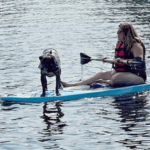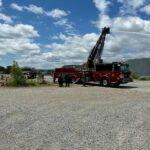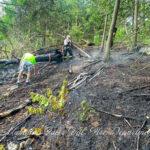PORT JERVIS – A Port Jervis resident is on a mission to accomplish something she says has been on her mind for a while. Mary Lou Hack, daughter of VFW Post 161 Past Commander Ed Worzel, niece of a WWII veteran, and herself secretary of the post’s auxiliary for the past six years, is collecting funds to have a stone for America’s canine veterans erected in her hometown’s historic Orange Square/Veterans Park.
Hack is committed to this, and wasting no time. She has set her sights on having a stone placed in time for this year’s Veterans Day salutes.
“America’s service dogs have saved countless lives. Many have been wounded or given up their lives for their handler. They are veterans, and they deserve recognition,” Hack said.
Hack said news of this project is spreading and donations are being received. She has the support of Port’s VFW Post 161 and its auxiliary, Naval Ship Post #7241 and permission from the city council to place such a stone. Support is growing among community organizations and the community overall.
“We have collected about $1500 so far, and need an estimated $3000 minimum. If more is collected, we can do more with this stone,” Hack said.

Highly trained, intensely loyal, and fiercely protective, America’s military service dogs consistently follow orders and protect America’s soldiers without hesitation. Formerly classified as “equipment” military canines were formerly left behind when their handlers came home. In recent decades, they are now required to be returned to the United States when their service concludes. Handlers are now given first rights for adoption, with public adoptions offered as an alternate option.
Three local dog handlers wish adoption had been a choice for them. The bond between a handler and a military canine partner is like no other. They spend hours, days, and years together, and their lives depend on each other.
These three local former military handlers are completely on board with Hack’s plan to honor canine veterans.

Hank Dunn of Port Jervis, a past commander at Post #161, served as a dog handler in Vietnam. His dog, Lobo, was required to stay behind when he completed his own service in 1969. Dunn credits Lobo and others with saving many American lives during the toughest of situations.
“The Viet Cong came at night, and the sentry dogs with their acute senses of smell and hearing were invaluable in our defense,” Dunn said in a recent interview. “We depended on our dogs to alert us to the presence of the enemy, which saved many lives over the course of the war.”
Robert Ridley of Sparrowbush never thought of becoming a dog handler when he was drafted in 1967. When he was assigned to this, Ridley and his sentry dog Heidi were sent to Pleiku, Central Vietnam. He recalls walking the perimeters of strategic locations together. One time his loyal canine partner broke out of an old cage where military dogs were kept at an airport at that time.

“There was a rocket attack at the airport, and I received a call that Heidi had broken out of her cage and was running loose around the airport,” Ridley said. “Fortunately, another handler had her by the time I arrived at the airport.”
Upon his discharge, Ridley had to leave his canine partner at Cam Rahn Bay, where she was teamed up with a handler who had lost his dog.
James Mulligan of Milford, PA, volunteered to become a dog handler when he joined the Army in 1966, at age 17. He arrived in Saigon later that year and was assigned a five-year-old German Shepherd scout dog named Rickey.
“I would carry a weapon in my right hand and a six-foot leash in my left hand. Rickey always knew exactly what he was to do. He never walked our patrol into an ambush or any booby tracks. He alerted on 45 ambushes, five in one day. We saved lives,” Mulligan said in a past interview. “He was so good at what he did that our enemies placed a bounty on us to try to stop us. Rickey and I interfered with enemy plans.”
While preparing to leave the service in 1970, Mulligan trained Rickey to work with another handler. He left his loyal canine behind, as required. He was later told that Rickey had to be put down about a year later, due to hip dysplasia, a problem common to Shepherds. Throughout his civilian lifetime, Mulligan has continued to adopt rescue dogs.
To contribute to a Port Jervis American Military Service Dog stone for Orange Square/Veterans Park, watch for Hack and supporters at local events. They will have a table at the July 3 Food Truck Fourth of July event in Riverside Park.
You may also send any donations to VFW Post #161, 47-51 Owen Street, Port Jervis, NY 12771. Please note in the memo section of checks: Military Dogs. Hack may be contacted by email at hackmary@yahoo.com or by phone at 845-856-7353 with any questions.








